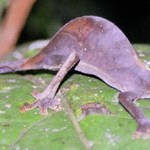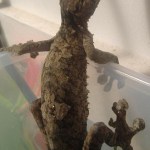Life Sciences
The list is growing fast - check the submissions to date and get inspired to submit something of your own - an essay, a poem, a cartoon or original art.
The Submission form is here so you can get started. Under the fold are entries so far, as well as buttons and the bookmarklet. The instructions for submitting are here.
============================
A Blog Around The Clock: What does it mean that a nation is 'Unscientific'?
A Blog Around The Clock: My latest scientific paper: Extended Laying Interval of Ultimate Eggs of the Eastern Bluebird
A Blog Around The Clock: Evolutionary Medicine: Does…
Time to press on once more with gekkotan lizards, and again with yet more on the remarkable leaf-tailed geckos (Uroplatus) of Madagascar. So far, we've been introduced to these lizards and have also looked at their anatomical pecularities and on a little bit of their history within the herpetological literature [image below shows U. phantasticus - I think - photographed at Mandatia; courtesy of Mary Blanchard].
But there's lots more to look at: at the recently named and soon-to-be-named species, at their phylogenetic position within Gekkota and, sadly, at their inevitable plight at human…
Lately, a paper to be published in the June edition of the American Naturalist has been getting some attention. The findings that are getting reported out of this paper didn't make sense to me, but I wondered if this was an issue with accuracy in reporting. So I went and found the paper. Turns out that the reporting is accurate, its the actual findings from the paper that confuse me. I really wanted to make sense of this paper, so I've been waiting a while to blog about it. But I can't make sense of one key finding.
Figure 1: An artist's rendition of me, being confused. If, you know, I were…
A "falsehood" is a belief held by a number of people that is in some way incorrect. That incorrectness may be blatant, it may be subtle, it may be conditional, it may be simple, it may be complex. But, the unraveling of the belief, even if much of that belief is in fact true, can be a learning experience in which future thinking about the issue is transformed. If the examination of the falsehood is accomplished in a thoughtful manner and without too much sophistry, this can be a rewarding experience. (If not, it can be rather awaste oftime.)
In order for a falsehood to "work" as a learning…
I've been following the reaction to the synthesis of a new life form by the Venter lab with some interest and amusement. There have been a couple of common directions taken, and they're generally all wrong. This is not to say that there couldn't be valid concerns, but that the loudest complaining voices right now are the most ignorant.
Hysteria and fear-mongering
Pearl-clutching and fretting over the consequences is fairly common, with a representative example from The Daily Mail (Stridently stupid 'journalistic' outlet).
But there are fears that the research, detailed in the journal Science…
For those of you who don't know, today is Endangered Species Day. Started in the US Senate, Endangered species day is observed every year on the third Friday in May. The point is to call attention to all the animals that are at risk of disappearing forever. The fact of the matter is, we're losing species at an unprecedented rate. Of the 47,978 species that have been described by the IUCN, 17,315 of those are endangered, and for most of the planet's species, there simply isn't enough data to tell.
For my part, I'm making a commitment. I have about five years at least to spend on these Hawaiian…
Get in the mood for this bit of news, the synthesis of an artificial organism by Craig Venter's research team.
Here's the equivalent of that twitching hand of Frankenstein's monster:
Those are two colonies of Mycoplasma mycoides, their nucleoids containing entirely synthesized DNA. You can tell because the synthesized DNA contained a lacZ gene for beta-galactosidase, making the pretty blue product. That's one of the indicators that the artificial chromosome is functioning inside the cell; the DNA was also encoded with recognizable watermarks, and they also used a cell of a different…
"In today's lecture, I will be casting false pearls before real swine"
... I won't tell you who said that, but when he did say it, he was in front of a classroom of several hundred Harvard freshmen, and he was referring to the idea of telling little white lies to the unwashed masses in order to achieve the dissemination of greater truth. No one in the room but the wizened teaching assistants, clustered off to the side furtively consuming their lunch in the "no food allowed" lecture hall, got the Biblical reference. There were spit takes.
But the problem with false pearls is that they don't…
Today, the U. S. Environmental Protection Agency announced that it would require BP to use a less toxic (and more effective) chemical dispersant than the brand used so far. I wish, I wish, I'm always wishing for these actions to sparkle with government intelligence and initiative.
But it's obvious that the EPA was responding to pressure created by media reports, starting with a first class piece of research from Greenwire and by resulting Congressional inquiries. In fact, the EPA appears to have stood passively by while BP dumped more than half a million gallons of the chemical dispersant…
So, you've had an introduction to the incredible leaf-tailed geckos (Uroplatus). In view of their bizarre appearance, it's perhaps not so surprising that leaf-tailed geckos have commanded attention for a long time and there's a large historical literature on these animals (see Bauer & Russell (1989) for review) [U. fimbriatus shown here; image by J. W. Connelly, from wikipedia].
The very first description comes from Etienne de Flacourt's L'Histoire de la Grand Ãle de Madagascar, published in 1658, and some accounts from the early 1700s - referring to animals from Chile, Arabia and Egypt…
The list is growing fast - check the submissions to date and get inspired to submit something of your own - an essay, a poem, a cartoon or original art.
The Submission form is here so you can get started. Under the fold are entries so far, as well as buttons and the bookmarklet. The instructions for submitting are here.
============================
A Blog Around The Clock: What does it mean that a nation is 'Unscientific'?
A Blog Around The Clock: My latest scientific paper: Extended Laying Interval of Ultimate Eggs of the Eastern Bluebird
A Blog Around The Clock: Evolutionary Medicine: Does…
Author's Note: This post was selected as the topic for the ResearchBlogCast as part of ResearchBlogging.org. Listen to the discussion here.
Could punishing bad behavior be the origin of human cooperation?Humans are one of the most cooperative species on the planet. Our ability to coordinate behavior and work collaboratively with others has allowed us to create the natural world's largest and most densely populated societies, outside of deep sea microbial mats and a few…
The list is slowly growing - check the submissions to date and get inspired to submit something of your own - an essay, a poem, a cartoon or original art.
The Submission form is here so you can get started. Under the fold are entries so far, as well as buttons and the bookmarklet. The instructions for submitting are here.
============================
A Blog Around The Clock: What does it mean that a nation is 'Unscientific'?
A Blog Around The Clock: My latest scientific paper: Extended Laying Interval of Ultimate Eggs of the Eastern Bluebird
A Blog Around The Clock: Evolutionary Medicine:…
We still don't have the faintest idea how much oil is spewing out of the well in the Gulf. Nor do we have the faintest idea what the full environmental consequence of what may well be the biggest single-event human-caused. ecological disaster of all time (the very fact that I have to add the word "single-event" to that statement should tell you something). We know that it is almost certainly more than all the low estimates to date, and we know that the ecological consequences will be huge, lasting and we do not understand them.
That is, we know some of the potential effects, we know they…
tags: Birdbooker Report, bird books, animal books, natural history books, ecology books
Books to the ceiling,
Books to the sky,
My pile of books is a mile high.
How I love them! How I need them!
I'll have a long beard by the time I read them.
~ Arnold Lobel [1933-1987] author of many popular children's books.
The Birdbooker Report is a special weekly report of a wide variety of science, nature and behavior books that currently are, or soon will be available for purchase. This report is written by one of my Seattle birding pals and book collector, Ian "Birdbooker" Paulsen, and is edited…
Matini chewed hungrily on the cooked forearm of the monkey as I watched, thinking, "WTF, is he really not going to share?" The others watched him with looks of incredulity that told me they were thinking the same thing. Finally, Latala said to Matini, thumb pointing sideways to me, "You know, he knows the rules."
"Huh?" Matini replied, looking up vaguely with his eyes while chewing the arm.
"You killed that monkey with an arrow he had given you. Therefore, that arm is his, according to our traditional way of dividing up the portions of animals we have hunted. But you are not sharing."…
Image via Discovery Press Web.
In his monumental 1945 monograph on mammal classification, paleontologist G.G. Simpson appraised the living species of elephants to be "relicts of a dying group." The living African (Loxodonta) and Asian (Elephas) elephants were all that remained of the past diversity of proboscideans, and human activities put even these large mammals at risk of extinction. Poaching and human development on land bordering game preserves continue to put elephants at risk, and the two-hour BBC special The Secret Life of Elephants, airing this Sunday on Animal Planet in the US,…
Thursday afternoon is the time when four out of seven PLoS journals publishe new articles and I pick those I find interesting myself. As always, you should rate the articles, post notes and comments and send trackbacks when you blog about the papers. You can now also easily place articles on various social services (CiteULike, Mendeley, Connotea, Stumbleupon, Facebook and Digg) with just one click. Here are my own picks for the week - you go and look for your own favourites:
Cardiorespiratory Phase-Coupling Is Reduced in Patients with Obstructive Sleep Apnea:
Cardiac and respiratory rhythms…
There are 24 new articles in PLoS ONE today. As always, you should rate the articles, post notes and comments and send trackbacks when you blog about the papers. You can now also easily place articles on various social services (CiteULike, Mendeley, Connotea, Stumbleupon, Facebook and Digg) with just one click. Here are my own picks for the week - you go and look for your own favourites:
Evidence for Emulation in Chimpanzees in Social Settings Using the Floating Peanut Task:
It is still unclear which observational learning mechanisms underlie the transmission of difficult problem-solving…
The jaws of C. megalodon as restored by Bashford Dean for the AMNH in 1909. Image from the American Museum Journal.
My early elementary reading school choices often got me into trouble. Every week I would pass over the recommended, grade-appropriate sections for the few shelves containing the books about dinosaurs, sharks, and alligators - if it was big and hard sharp teeth, I wanted to learn about it. The school librarian was not too pleased with this, even calling my parents in on one occasion to insist that I read something fit for younger children, but I just could not get enough of…



